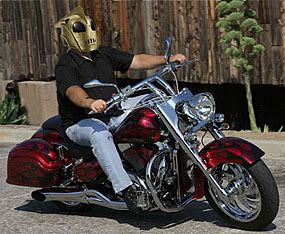
Florida Hurricane Season Preparations
We're about to enter the peak of the hurricane season. Any day now, you're going
to turn on the TV and see a weather person pointing to some radar blob out in
the Atlantic Ocean and making two basic meteorological points:
(1) There is no need to panic.
(2) We could all die.
Yes, hurricane season is an exciting time to be in Florida. If you're new to the
area, you're probably wondering what you need to do to prepare for the
possibility that we'll get hit by "the big one." Based on our experiences, we
recommend that you follow this simple three-step hurricane preparedness plan:
STEP 1: Buy enough food and bottled water to last your family for at least seven
days.
STEP 2: Put these supplies into your car.
STEP 3: Drive to Nebraska and remain there until New Years Day.
Unfortunately, statistics show that most people will not follow this sensible
plan. Most people will foolishly stay here in Florida. So, we'll start with one
of the most important hurricane preparedness items:
HOMEOWNERS' INSURANCE:
If you own a home, you must have hurricane insurance. Fortunately, this
insurance is cheap and easy to get, as long as your home meets two basic
requirements:
(1) It is reasonably well-built, and
(2) It is located in Nebraska or Idaho.
Unfortunately, if your home is located in Florida, or any other area that might
actually be hit by a hurricane, most insurance companies would prefer not to
sell you hurricane insurance, because then they might be required to pay YOU
money, and that is certainly not why they got into the insurance business in the
first place. So you'll have to scrounge around for an insurance company, which
will charge you an annual premium roughly equal to the replacement value of your
house. At any moment, this company can drop you like used dental floss. Since
Hurricane Wilma, I have had an estimated 27 different home-insurance
companies. This week, I'm covered by the Bob and Big Earl's Insurance Company,
under a policy which states that, in addition to my premium, Bob and Big Earl
are entitled, on demand, to my kidneys, liver, and my 1st born male.
SHUTTERS:
Your house should have hurricane shutters on all the windows, all the doors, and
-- if it's a major hurricane -- all the toilets and sinks. There are several
types of shutters, with advantages and disadvantages:
Plywood shutters: The advantage is that, because you make them yourself, they're cheap.
The disadvantage is that, because you make them yourself, they will blow off.
Sheet-metal shutters: The advantage is that these work well, once you get them
all up. The disadvantage is that once you get them all up, your hands will be
useless bleeding stumps, and it will be December.
Roll-down shutters: The advantages are that they're very easy to use, and will
definitely protect your house. The disadvantage is that you will have to sell
your house to pay for them.
Hurricane-proof windows: These are the newest wrinkle in hurricane protection:
They look like ordinary windows, but they can withstand hurricane winds! You can
be sure of this, because the salesman says so. He lives in Nebraska.
Hurricane Proofing your property: As the hurricane approaches, check your yard
for movable objects like barbecue grills, planters, patio furniture, alligators,
neighbor's, pets, visiting mother in law, etc... You should, as a precaution,
throw them into your swimming pool (if you don't have a swimming pool, you
should have one built immediately). Otherwise, the hurricane winds will turn
these objects into deadly missiles.
EVACUATION ROUTE:
If you live in a low-lying area, you should have an evacuation route planned
out. (To determine whether you live in a low-lying area, look at your driver's
license; if it says "Florida," you live in a low-lying area). The purpose of
having an evacuation route is to avoid being trapped in your home when a major
storm hits. Instead, you will be trapped in a gigantic traffic jam several miles
from your home, along with two hundred thousand other evacuees. So, as a
bonus, you will not be lonely. It helps to take a cooler of beer and barbeque
supplies. Interstate barbeques have become quite popular during evacuations.
HURRICANE SUPPLIES:
If you don't evacuate, you will need a mess of supplies. Do not buy them now!
Florida tradition requires that you wait until the last possible minute, then go
to the supermarket and get into vicious fights with strangers over who gets the
last can of SPAM or Vienna Sausages. In addition to food and water, you will
need the following supplies:
1. 23 flashlights. At least $167 worth of batteries that will turn out to be the wrong
size for the flashlights, when the power goes off.
2. Bleach. (No, I don't know what the bleach is for. NOBODY knows what the
bleach is for, but it's traditional, so get some anyway!)
3. 55 gallon drum of underarm deodorant.
4. A big honkin knife that you can strap to your leg. (This will be useless in a
hurricane, but it looks cool.)
5. A large quantity of raw chicken, to placate the alligators. (Ask anybody who
went through Andrew; after the hurricane, there WILL be irate alligators.)
6. $35,000 in cash, gold or diamonds so that, after the hurricane passes, you can buy
a generator, water, ice, or chainsaw from a dirty man with no discernible teeth.
Of course these are just basic precautions. As the hurricane draws near, it is
vitally important that you keep abreast of the situation by turning on your
television and watching TV reporters in rain slickers standing right next to the
ocean and telling you over and over how vitally important it is for everybody to
stay away from the ocean.












